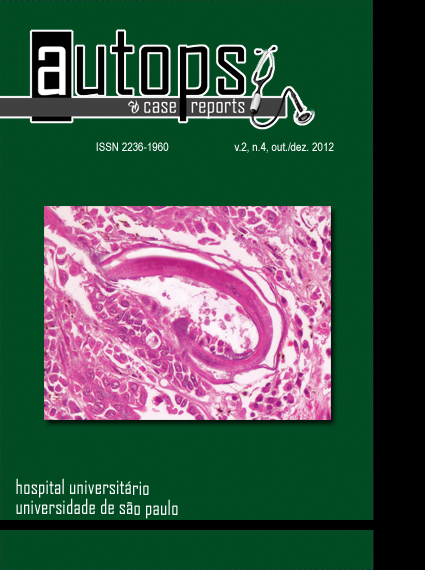Paroxysmal nocturnal hemoglobinuria: rare cause of acute renal failure
DOI:
https://doi.org/10.4322/acr.%25y.48368Keywords:
Hemoglobinuria, Paroxysmal, Anemia, Hemolytic, Acute kidney injury, Flow cytometryAbstract
Paroxysmal nocturnal hemoglobinuria is a rare acquired disease, characterized by hemolytic anemia, recurrent infections, cytopenias, and vascular thrombosis. It occurs by non-malignant clonal expansion of one or more hematopoietic stem cells that acquired somatic mutations in PIG-A gene linked to chromosome X. This mutation results in lower erythrocyte expression of CD55 and CD59 surface proteins and consequently increased susceptibility to the complement system. The renal involvement is generally benign, resulting in mild impairment in urinary concentration. Acute renal failure requiring hemodialytic support accompanying PNH is rarely observed. The authors report a case of a 37-year-old male who presented with bicytopenia (hemolytic anemia and thrombocytopenia) associated with acute renal failure requiring dialysis. Diagnosis was challenging because of the rarity and unfamiliarity with this entity, but was confirmed by flow cytometry. In the course of the disease, acute pyelonephritis with multiple renal abscesses was diagnosed requiring prolonged antibiotic therapy. Patient outcome was favorable after the control of hemolysis and the infection treatment.Downloads
Download data is not yet available.
Downloads
Issue
Section
Article / Clinical Case Report
License
Copyright
Authors of articles published by Autopsy and Case Report retain the copyright of their work without restrictions, licensing it under the Creative Commons Attribution License - CC-BY, which allows articles to be re-used and re-distributed without restriction, as long as the original work is correctly cited.
How to Cite
Takayasu, V., Kanegae, M. Y., & Rays, J. (2012). Paroxysmal nocturnal hemoglobinuria: rare cause of acute renal failure. Autopsy and Case Reports, 2(4). https://doi.org/10.4322/acr.%y.48368



